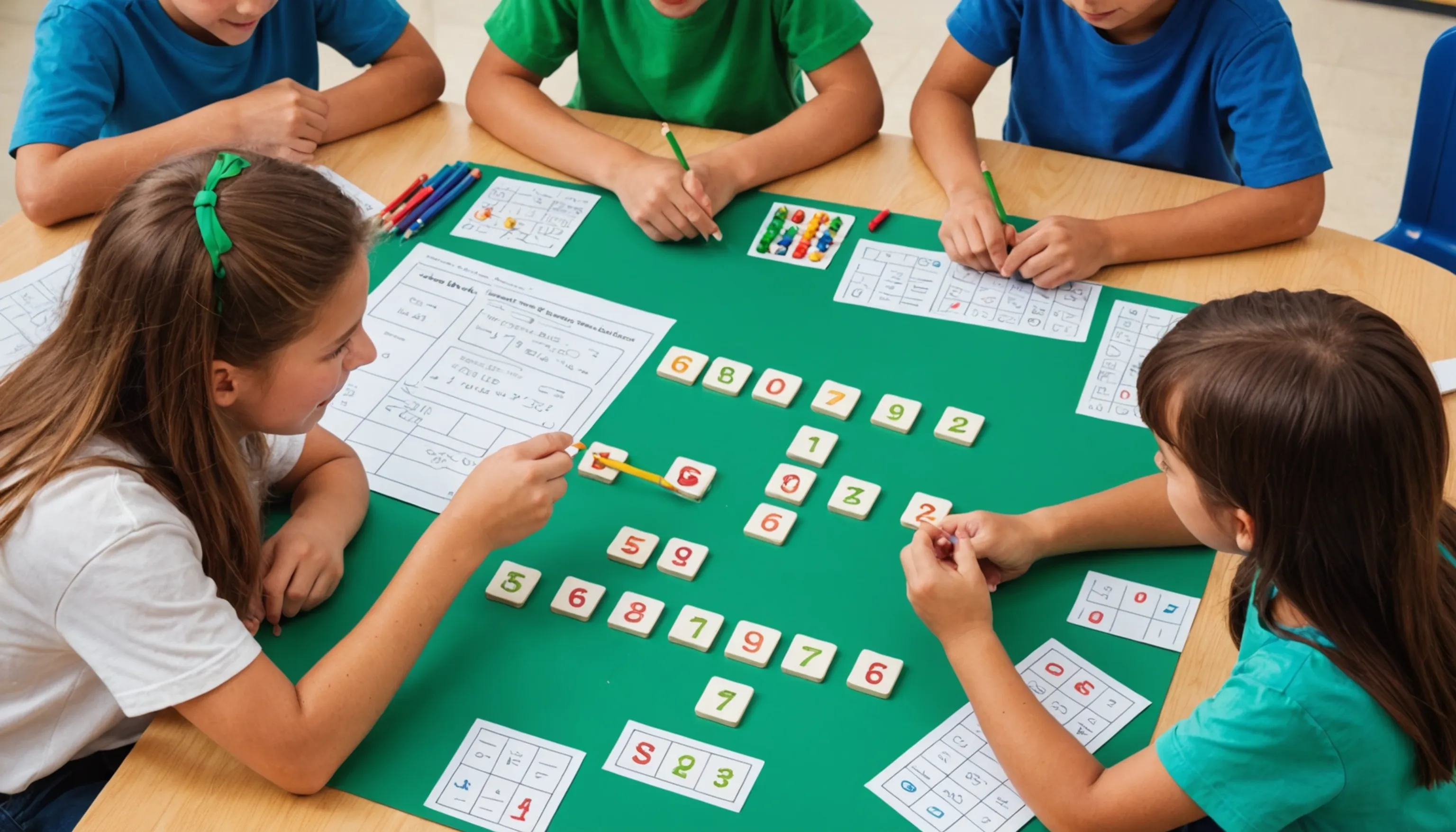Math Games for Students
 HvWHenry van Wagenberg
HvWHenry van Wagenberg
Fun Math Games for Students
Engaging in fun math games can transform the way students perceive mathematics. These games not only make learning enjoyable but also reinforce essential math skills. From interactive online platforms to hands-on board games, the options are vast. For instance, games like Math Jeopardy or 24 Game encourage critical thinking and quick calculations.
Moreover, incorporating competition through math relays or group challenges can foster teamwork while enhancing problem-solving abilities. By integrating these games into regular study routines, students can develop a positive attitude towards math, improving their confidence and performance in the subject.
Benefits of Math Games for Learning
Incorporating math games into learning has numerous benefits that extend beyond mere enjoyment. Firstly, these games provide a unique opportunity for students to apply mathematical concepts in a practical context. This experiential learning helps solidify their understanding and retention of key principles.
Secondly, math games promote engagement and motivation. When students are actively involved in games, they are more likely to participate willingly, reducing anxiety often associated with traditional math exercises. This can lead to a more positive attitude towards mathematics, which is crucial for long-term success.
Another significant benefit is the development of critical thinking and problem-solving skills. Many math games require players to think strategically and make decisions based on mathematical reasoning, which enhances cognitive abilities. For example, games like Math Bingo or Sudoku encourage logical thinking while reinforcing fundamental math skills.
Social interaction is also a vital aspect of learning through games. When students play in groups, they learn to communicate their thought processes and collaborate with peers. This builds essential teamwork skills and fosters a sense of community within the classroom.
Lastly, math games can be easily tailored to different learning styles and levels, making them an inclusive tool for diverse classrooms. Whether through online platforms or traditional board games, the adaptability of math games ensures that all students can benefit from this engaging learning method.

Top Math Games for Teenagers
When it comes to keeping teenagers engaged in math, choosing the right games is essential. Here are some of the top math games that can make learning enjoyable and effective:
- Prodigy Math: An online game that combines math practice with an engaging adventure, allowing students to solve problems to progress in the game.
- Math Blaster: This classic game offers various challenges that require problem-solving and quick calculations, making it perfect for sharpening math skills.
- 24 Game: A fast-paced card game where players use basic operations to reach the number 24, promoting mental math and strategic thinking.
- Math Jeopardy: A fun, competitive game that can be played in groups, reinforcing various math concepts through quiz-style questions.
Incorporating these games into study sessions can enhance understanding and foster a love for math among teenagers.
Online Math Games
Online math games have revolutionized the way students approach learning mathematics, providing a fun and interactive platform for practice. One of the significant advantages of online math games is their accessibility. Students can play these games from anywhere, whether at home or on the go, which makes learning flexible and convenient.
Platforms like Kahoot! and IXL offer engaging math challenges that adapt to individual skill levels, ensuring that students are adequately challenged without feeling overwhelmed. These games often incorporate elements of competition, allowing students to compete against their peers or even themselves, which can motivate them to improve.
Another benefit is the immediate feedback provided by online math games. Students receive instant results on their performance, helping them identify areas for improvement. Additionally, many games include progress tracking features that allow students to monitor their growth over time.
Furthermore, online math games can cater to various learning styles. For visual learners, games with colorful graphics and animations can make concepts more relatable, while auditory learners benefit from games that incorporate sound effects and verbal instructions.
Overall, online math games create an engaging learning environment that fosters a love for mathematics while helping students build confidence and competence in their skills. By integrating these games into the curriculum, educators can enhance traditional teaching methods and make math more enjoyable for students.

Board Games that Teach Math Skills
Board games that teach math skills are a fantastic way to make learning engaging and interactive. These games not only provide entertainment but also reinforce essential mathematical concepts in a fun environment. One popular game is Monopoly, which teaches players about money management, addition, and subtraction through buying properties and calculating rent.
Another excellent choice is Sum Swamp, designed specifically for younger students. In this game, players navigate a swamp while solving basic addition and subtraction problems, making math practice enjoyable and immersive. Similarly, Prime Climb offers a colorful board where players use multiplication and division as they work their way to the center, promoting a deep understanding of numbers.
Math Bingo is another engaging option, where players match numbers on their cards to solve math problems called out by the host. This game not only encourages quick thinking but also fosters a competitive spirit.
Additionally, games like Blokus and Set enhance spatial reasoning and pattern recognition, which are crucial in mathematics. By incorporating these board games into family game nights or classroom activities, parents and teachers can create a supportive learning atmosphere that encourages mathematical exploration and boosts confidence in students' abilities.
Tips for Incorporating Math Games into Study Time
Incorporating math games into study time can significantly enhance learning and retention. Here are some effective tips to integrate these games into your routine:
- Set Clear Goals: Define specific math concepts or skills you want to reinforce through games, such as addition, fractions, or geometry.
- Choose Appropriate Games: Select games that align with the learning objectives and the student’s skill level. Consider both online and board games for variety.
- Schedule Regular Game Time: Designate specific times during the week for game sessions, making it a fun and consistent part of the study routine.
- Encourage Friendly Competition: Create a competitive yet supportive environment by allowing students to play against each other, fostering motivation and engagement.
- Debrief After Play: Discuss the math concepts learned during the game, reinforcing understanding and identifying areas for improvement.
By following these tips, math games can become a valuable tool in enhancing students' mathematical skills while making learning enjoyable.
Creating a Game Night for Math Practice
Creating a game night dedicated to math practice can be a fun and effective way to reinforce mathematical skills while fostering family bonding. Here’s how to organize an engaging math game night:
1. Choose the Right Games: Select a variety of games that cater to different skill levels and age groups. Include a mix of board games like Math Bingo and card games like 24 Game, alongside online math games for added variety.
2. Set a Date and Time: Pick a specific evening that works for everyone. Make it a regular event, such as once a week or bi-weekly, to establish a routine.
3. Create a Comfortable Environment: Set up a cozy space with enough seating and good lighting. Prepare snacks and drinks to keep everyone energized and engaged throughout the night.
4. Incorporate Challenges: Add a competitive edge by organizing mini-tournaments with small prizes or certificates for winners. This can motivate participants to put forth their best effort.
5. Reflect and Discuss: After the games, take some time to discuss what everyone learned and enjoyed. Encourage players to share strategies and math concepts they found particularly interesting.
By making math practice enjoyable through a game night, you can help strengthen mathematical skills while creating lasting memories with family and friends.
Using Apps and Online Resources for Math Games
Utilizing apps and online resources for math games can significantly enhance the learning experience for students. With technology at our fingertips, there are numerous platforms designed to make math practice engaging and effective. Here are some ways to incorporate these resources into study routines:
1. Explore Educational Apps: Many apps, such as Prodigy Math and Kahoot!, offer interactive math challenges tailored to various grade levels. These apps often include gamified elements, like rewards and progress tracking, to keep students motivated.
2. Use Online Platforms: Websites like IXL and Coolmath Games provide a wide range of math games covering different concepts. These platforms often adapt to the student’s skill level, ensuring appropriate challenges that promote growth.
3. Encourage Collaboration: Many online resources allow students to play with friends or classmates, fostering a sense of community and encouraging cooperative learning. Multiplayer options can make math practice more enjoyable.
4. Set Goals and Track Progress: Encourage students to set specific goals for their app usage, such as completing a certain number of levels or mastering specific concepts. Regularly reviewing their progress can help them stay accountable and motivated.
By effectively integrating apps and online resources into math study sessions, students can enjoy a modern, dynamic approach to learning that fosters both skill development and enthusiasm for mathematics.
